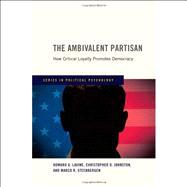The Ambivalent Partisan How Critical Loyalty Promotes Democracy
, by Lavine, Howard G.; Johnston, Christopher D.; Steenbergen, Marco R.- ISBN: 9780199772759 | 0199772754
- Cover: Hardcover
- Copyright: 11/13/2012
Over the past half century, two overarching questions have dominated the study of mass political behavior: How do ordinary citizens form their political judgments, and how good are those judgments from a normative perspective? The authors of The Ambivalent Partisan offer a novel approach tothese questions, one in which political reasoning is viewed as arising from trade-offs among three generally conflicting psychological goals: making decisions easily, getting them right, and maintaining cognitive consistency. Taking aim at decades of received wisdom, the central claim of this book is that high-quality political judgment hinges less on citizens' cognitive ability than on their willingness to temporarily suspend partisan habits and follow the "evidence" wherever it leads. This occurs most readily whencitizens experience a disjuncture between their stable political identities and their contemporary evaluations of party performance, a state the authors refer to as partisan ambivalence. Drawing on both experimental and survey methods - as well as five decades of American political history - theauthors demonstrate that compared to other citizens, ambivalent partisans perceive the political world accurately, form their policy preferences in a principled manner, and communicate those preferences by making issues an important component of their electoral decisions. The book's most important conclusion is that a non-trivial portion of the electorate manages to escape the vicissitudes of apathy or wanton bias, and it is these citizens - these ambivalent partisans - who reliably approximate a desirable standard of democratic citizenship.






